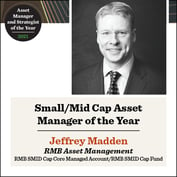“[That’s] because in an environment where there’s a lot of business disruption, those businesses that are less disrupted are going to do better on a relative basis than those that are experiencing high levels of disruption,” Johnson explains.
Riverbridge owns “portfolios of businesses that, compared to any benchmark, tend to have more stability,” he pointed out.
In 2020, companies with strategic relationships with customers through the services they provide tended to perform well because “these relationships have a high level of stickiness,” he explains, adding that “customers can’t do business without them.” For example, the portfolio included Verisk, a firm that supplies data and information to the property and casualty insurance market.
“Their customers, the carriers that underwrite property and casualty policies, can’t do business without Verisk services,” Johnson says, adding: “In a world like 2020 that experienced high levels of business disruption, those types of strategic relationships were far more stable in nature.” Other characteristic targets are companies that “tend to have clean balance sheets and low levels of leverage.”
“What’s unique at Riverbridge is our commitment to an investment philosophy,” he states. “A lot of people who invest in the market think of it as a market trading game. They don’t necessarily have a firm philosophy in which they stand on.
“We’re not affected by the short-term crosswinds in the market. Our philosophy is centered around this concept of earnings power. And we believe that those companies that can grow earnings power over long periods of time, that value will be recognized,” the portfolio manager explains.
In addition, “we have a strong recognition amongst our team that true innovation and value creation takes time,” which is “somewhat opposed to how the financial services industry operates,” he says.
Riverbridge’s process also relies “on a team of portfolio managers who have a lot of individual accountability for the decisions they make, and we avoid the trappings of consensus decision-making,” Johnson says.
“That makes our selections of companies in which we want to invest and ultimately the portfolios that we build very effective over long periods of time. It also makes us, as a firm, more resilient because we’re really not dependent on any one star individual,” he points out.
Due to its investment philosophy, the team did not tweak its portfolio based on its short-term outlook, Johnson says, explaining: “Short-term dynamics are often challenging to predict. And they’re especially [hard] to predict on a repeatable basis. So we keep ourselves focused on that earnings power growth, over five- and 10-year periods.”
In 2021, although there is “a strong backdrop for economic growth,” inflation has become a concern. Yet “over longer periods of time in the equity markets, more differentiated businesses tend to do better in an inflationary environment,” he explains.
Therefore, should inflation persist, differentiated businesses will likely “have an easier time passing through increasing costs, and they’ll do better relative to more commodity businesses where there aren’t a lot of differentiation between one company and the next,” the portfolio managers predicts.








 June 22, 2021 at 10:30 AM
June 22, 2021 at 10:30 AM











